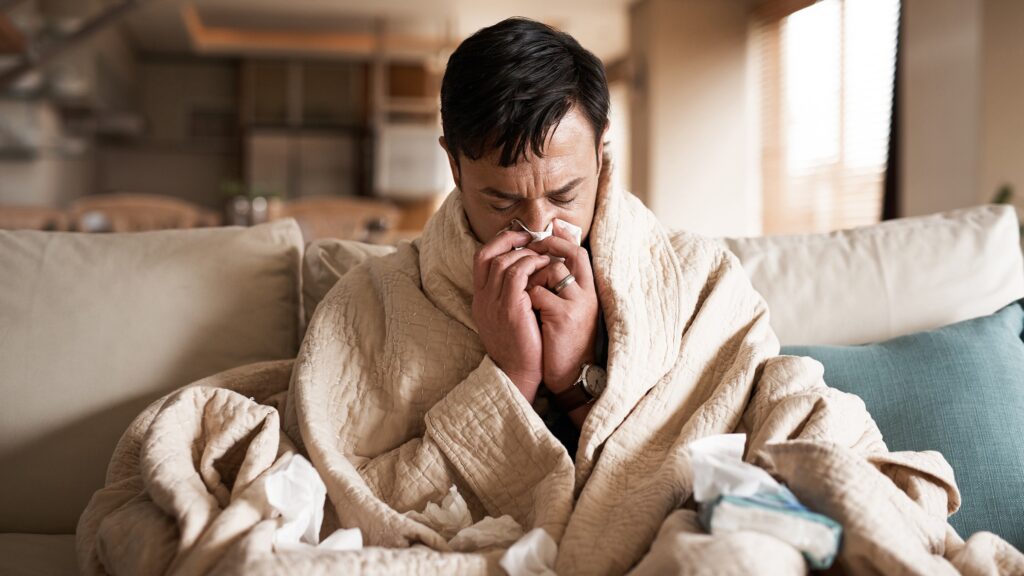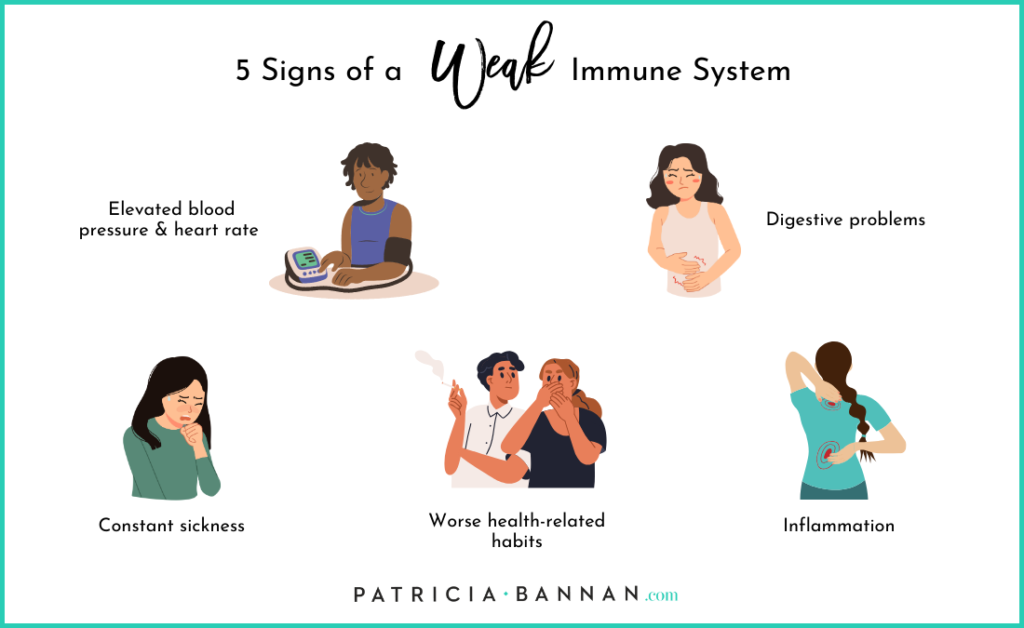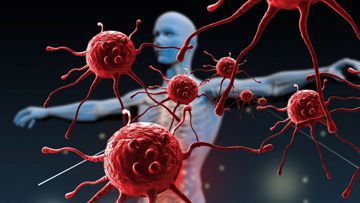
A weak immune system (immunodeficiency) reduces the body’s ability to fight infections and heal properly. It can result from genetics, chronic illness, poor lifestyle habits, aging, or stress. Recognizing warning signs early like frequent infections, fatigue, and slow recovery helps prevent complications and maintain better health.
Key Takeaways
- Weak immunity increases risk of repeated infections, delayed healing, and persistent fatigue.
- Causes include chronic illness, nutrient deficiency, stress, sleep deprivation, medications, and aging.
- Common signs: frequent colds, swollen lymph nodes, digestive issues, mouth sores, and unexplained weight loss.
- Diagnosis relies on medical history, physical exam, and blood or immune function tests.
- Prevention: balanced diet, adequate sleep, stress control, vaccination, and active lifestyle.
- Myths like “instant immunity from supplements” are false, sustained habits build real immune strength.
Introduction to the Immune System
Your immune system is your body’s main defense against germs, viruses, and other harmful invaders. It works quietly and constantly, protecting you from infections and helping you heal when you get sick. Without a strong immune system, even minor illnesses can become serious.
The immune system is made up of different cells, tissues, and organs that all work together. White blood cells, lymph nodes, the spleen, and bone marrow are just some of the key parts that help find and destroy harmful substances.
There are two main parts to the immune system:
- Innate Immunity:
This is your body’s first line of defense. It responds quickly and attacks anything it recognizes as foreign, like bacteria or viruses. - Adaptive Immunity:
This part learns to recognize specific germs. If you get exposed to the same infection again, your adaptive immunity responds faster and stronger.
What is Weak Immune System
A weak immune system, also called immunodeficiency, means your body cannot protect you from infections as effectively. This condition can be present from birth or develop later in life. While some people are born with genetic disorders affecting their immunity, others develop problems because of illness, lifestyle, or medication.
People with weak immunity get sick more often, recover slowly, and may have complications that healthy people rarely face.
Signs of a Weak Immune System

Recognizing the signs of a weak immune system early can help you take action and avoid serious health problems. Your body gives you signals when your immune defenses are not working as they should. If you notice several of these signs, it may be time to pay closer attention to your health.
- Frequent Infections: You get colds, sinus infections, bronchitis, ear infections, or pneumonia more often than usual.
- Infections That Linger: Illnesses last much longer than they do for other people, or they keep coming back soon after you recover.
- Slow Wound Healing: Cuts, scrapes, or skin injuries take a long time to close up and heal. You might notice the area stays red, swollen, or painful for days or weeks.
- Chronic Digestive Issues: Stomach pain, diarrhea, gas, or bloating happen regularly without a clear reason.
- Persistent Fatigue: You feel tired or weak all the time, even after a full night’s sleep and rest.
- Frequent Fevers: You often run a temperature without an obvious cause, which may show your body is fighting off hidden infections.
- Recurring Skin Problems: Rashes, inflammation, or skin infections are common and do not clear up easily.
- Enlarged Lymph Nodes: Glands in your neck, armpit, or groin may stay swollen or feel tender.
- Unexplained Weight Loss: You lose weight quickly without changing your diet or exercise routine.
- Frequent Mouth Issues: Mouth sores, gum infections, or thrush (white patches in the mouth) occur repeatedly.
Symptoms Associated with Immune System Weakness
Beyond the main signs, certain symptoms often show up together. These symptoms can give a more detailed picture of how your immune system is performing.
- Chronic Sinus or Respiratory Infections: Repeated sinusitis, bronchitis, or pneumonia.
- Mouth Issues: Recurring mouth ulcers or oral thrush are frequent in people with low immunity.
- Unexplained Weight Loss: Losing weight without trying can be a sign of underlying infection or immune problems.
- Enlarged Lymph Nodes: Swollen glands in the neck, armpit, or groin that do not go away.
- Frequent Viral Infections: Illnesses like cold sores, shingles, or warts may keep coming back.
- Persistent Respiratory Issues: Shortness of breath or long-lasting cough.
- Symptoms by Age: Children might show more ear infections or trouble growing, while adults may have fatigue or joint pain.
Causes of a Weak Immune System
Understanding what leads to a weak immune system allows you to manage risks better. Causes can be primary, where you are born with a problem, or secondary, where something changes your immunity over time.
Primary Causes
Some people inherit conditions that make their immune system weak from birth. These are rare and often diagnosed early in life.
- Genetic Conditions:
Some people are born with disorders that make their immune system less effective. These are called primary immunodeficiencies and are usually diagnosed early in life. Examples include severe combined immunodeficiency and common variable immunodeficiency.
Secondary Causes
These causes develop later and are much more common.
- Chronic Illnesses:
Diseases like diabetes, kidney disease, liver disease, HIV/AIDS, and certain cancers can all weaken the body’s natural defenses. These illnesses affect how well the immune system can detect and fight germs. - Medications:
Some treatments are designed to suppress the immune system on purpose, such as steroids, chemotherapy for cancer, or drugs taken after organ transplants. These medicines reduce your body’s ability to respond to infections. - Nutritional Deficiencies:
Not getting enough vitamins and minerals, especially vitamin D, vitamin C, zinc, or protein, can make your immune system less effective. Poor nutrition over time weakens the body’s overall ability to fight off sickness. - Aging:
The immune system becomes slower and less responsive as people age. This is why older adults are more likely to get infections and may take longer to recover. - Long-term Stress:
Ongoing stress produces hormones that reduce immune function. People under constant stress get sick more easily and have trouble recovering. - Lack of Sleep:
Regularly not getting enough sleep can reduce the body’s ability to defend against illness and infection. - Lifestyle Habits:
Smoking, heavy alcohol use, lack of physical activity, and unhealthy eating habits can all lower immune function. - Environmental Factors:
Being exposed to pollution, harmful chemicals, or radiation at home or work can damage immune cells and reduce your natural defenses.
Risk Factors for Immunodeficiency

Certain factors make it more likely that you’ll develop a weak immune system. If you have more than one, your risk increases.
- Family History: If others in your family have immune problems, your risk is higher.
- Other Health Conditions: Diseases like diabetes or autoimmune disorders strain your immune system.
- Work or Environment: Healthcare workers, lab staff, and people exposed to chemicals are at greater risk.
- Frequent Hospitalization: More contact with germs and use of medications can weaken immunity over time.
How Doctors Diagnose a Weak Immune System
If you suspect a weak immune system, a doctor can confirm the diagnosis with a series of steps.
- Detailed History: The doctor will ask about infections, healing, and family medical background.
- Physical Exam: Checking for swollen glands, rashes, or signs of ongoing infection.
- Blood Tests: Complete blood count (CBC), immunoglobulin levels, and white blood cell counts.
- Special Tests: In some cases, tests look at specific immune cells or how you respond to vaccines.
Weak Immune System in Special Populations
Certain groups are at greater risk and need more attention.
- Infants and Children: Their immune systems are still developing, so warning signs like slow growth or repeated ear infections need careful monitoring.
- Elderly: Natural aging reduces immune response, increasing the risk of severe infections.
- Pregnant Women: Pregnancy changes immune balance, making some women more prone to infection.
- Cancer Patients: Both the illness and its treatments can lower immunity.
Complications from an Untreated Weak Immune System
Not treating a weak immune system can have serious effects. Here’s what might happen:
- Severe or Repeated Infections: You may face dangerous infections that are hard to treat or keep coming back.
- Autoimmune Conditions: Sometimes, the immune system attacks the body’s own tissues.
- Increased Cancer Risk: Lower immune surveillance can make it easier for cancers to develop.
- Organ Damage: Ongoing infections or inflammation can harm major organs over time.
Preventive Strategies and Lifestyle Modifications
While not every cause is preventable, certain steps help boost immune strength and lower your risk. These are simple, practical habits for everyday life.
- Eat a Balanced Diet: Include a variety of fruits, vegetables, lean protein, and whole grains. Deficiencies in vitamins and minerals can make immunity worse.
- Stay Active: Regular moderate exercise supports a healthy immune system.
- Prioritize Sleep: Adults should aim for at least 7-8 hours of sleep each night.
- Manage Stress: Use relaxation techniques like meditation or yoga to keep stress in check.
- Keep Vaccinations Updated: Vaccines protect you from many common and serious infections.
- Limit Alcohol and Avoid Smoking: Both can damage your immune cells.
- Practice Good Hygiene: Wash hands regularly, and avoid close contact with people who are sick.
- Avoid Environmental Toxins: Use protective equipment at work and avoid exposure to harsh chemicals.
Medical Treatments and Interventions
For those with a diagnosed weak immune system, medical treatment may be needed alongside lifestyle changes.
- Immunoglobulin Therapy: Injections or infusions of antibodies help some people prevent infections.
- Preventive Antibiotics: Sometimes given regularly to prevent certain types of infections.
- Vaccines: Special vaccines or more frequent boosters may be recommended.
- Treating Underlying Conditions: Keeping chronic diseases under control supports immune health.
- Hospital Care: In severe cases, treatment in a hospital with antibiotics or antiviral drugs may be needed.
Myths and Facts About the Immune System
There are many widespread beliefs about the immune system that are not supported by science. Knowing the difference between myths and facts can help you make smarter choices for your health.
Myth: Taking large amounts of vitamin C or supplements instantly boosts your immune system.
Fact: While vitamin C is important for immune health, high doses will not prevent illness or work instantly. A balanced diet over time is what really supports immunity.
Myth: If you never catch a cold, your immune system is extra strong.
Fact: Occasionally getting sick is normal and even helps your immune system “learn” to fight germs better in the future.
Myth: Stress does not really affect your immune system.
Fact: Ongoing or severe stress releases hormones that lower your immune response and make you more likely to get sick.
Myth: Antibiotics can help treat viral infections like colds and the flu.
Fact: Antibiotics only work against bacteria, not viruses. Using them when you don’t need to can weaken your immune defenses in the long run.
Myth: A strong immune system means you will never get sick.
Fact: No immune system can prevent all infections, but a healthy one usually helps you recover faster and with fewer complications.
Myth: Only people with chronic diseases have weak immune systems.
Fact: Many factors can weaken immunity, including poor diet, lack of sleep, age, stress, and certain medications, not just chronic illness.
Myth: Hand sanitizers replace hand washing for good immune health.
Fact: Hand sanitizers can help when soap and water are not available, but regular hand washing is still best for removing germs and keeping your immune system from being overwhelmed.
Myth: You can “train” your immune system to be stronger by exposing yourself to germs on purpose.
Fact: Deliberate exposure to harmful bacteria or viruses is risky and can cause serious illness. Proper hygiene and vaccinations are safer ways to build protection.
Myth: Getting the flu vaccine can give you the flu.
Fact: The flu vaccine uses inactivated or weakened virus, so it cannot cause flu infection. Some people may have mild side effects, but these are not the flu.
Myth: Sleep does not matter as long as you eat healthy.
Fact: Getting enough quality sleep is just as important as a balanced diet for a healthy immune system. Lack of sleep makes you more prone to infection.
When to See a Doctor
Knowing when to seek medical help is crucial if you suspect your immune system may be weak. Early evaluation can prevent complications and help you get the right treatment. If you notice any of these warning signs or changes in your health, make an appointment with your healthcare provider:
- Frequent Infections: You get infections such as sinus infections, bronchitis, pneumonia, or ear infections more often than others your age.
- Infections That Are Severe or Unusual: Illnesses are more intense, last longer, or do not respond well to standard treatments.
- Slow Healing: Cuts, scrapes, or wounds take much longer than normal to heal.
- Chronic Digestive Problems: Ongoing diarrhea, stomach cramps, or bloating without a clear cause.
- Unexplained Fever: You have repeated fevers without an obvious reason.
- Persistent Fatigue: Constant tiredness or weakness that does not improve with rest.
- Frequent Mouth Sores or Thrush: Recurrent oral health problems that do not go away easily.
- Swollen Lymph Nodes: Glands in your neck, armpit, or groin that stay enlarged or tender.
- Unusual Weight Loss: Losing weight quickly without trying or without a clear explanation.
- Family History: A close relative has an immune system disorder, and you have similar symptoms.
Conclusion
A weak immune system, or immunodeficiency, means your body cannot fight infections as effectively, making you prone to frequent or lingering illnesses, slow wound healing, and persistent fatigue. Causes include genetic conditions, chronic diseases like diabetes or HIV, certain medications, poor nutrition, aging, stress, and unhealthy habits. Special groups such as infants, the elderly, pregnant women, and those with chronic illness are more at risk. Warning signs to watch for include repeated infections, digestive problems, swollen lymph nodes, and unexplained weight loss.
Diagnosis involves medical history, physical exam, and blood tests. If untreated, a weak immune system can lead to severe infections, autoimmune problems, or organ damage. Preventive steps like good nutrition, exercise, enough sleep, stress management, and vaccinations help strengthen immunity. Myths such as “vitamin C cures all” or “stress doesn’t matter” are common, but understanding real risks and seeing a doctor when symptoms appear is essential.
FAQs
What are the first signs of a weak immune system?
Frequent infections, slow healing, and constant tiredness are common early signs.
Can stress alone weaken the immune system?
Yes, chronic stress can suppress immune function and increase illness risk.
Which diseases are most likely if you have a compromised immune system?
Respiratory infections, digestive tract infections, and skin problems are most common.
How do doctors test immune system strength?
Through blood tests, medical history, and sometimes specific immune function tests.
Are there foods or supplements that genuinely boost immunity?
A balanced diet with enough vitamins and minerals supports immune health, but no single food or supplement is a miracle cure.
Can a weak immune system be reversed or cured?
In some cases, especially when caused by lifestyle or certain illnesses, improvements are possible. For genetic causes, long-term management is needed.
Are children more prone to immune weakness than adults?
Children’s immune systems are still developing, so they may get sick more often, but this often improves with age.
How do lifestyle choices affect immune function?
Poor diet, lack of sleep, smoking, and inactivity all lower immune defenses.
What’s the difference between primary and secondary immunodeficiency?
Primary means you are born with it, while secondary develops later due to other factors.
When should someone with frequent infections seek medical help?
If infections are frequent, severe, or unusual, see a doctor for evaluation.
Reference
- National Institutes of Health (NIH). (2023). How does the immune system work?
https://www.nih.gov/news-events/nih-research-matters/how-immune-system-works - Centers for Disease Control and Prevention (CDC). (2024). Immunodeficiency Disorders.
https://www.cdc.gov/immune-deficiencies - Mayo Clinic. (2024). Primary immunodeficiency: Symptoms and causes.
https://www.mayoclinic.org/diseases-conditions/primary-immunodeficiency/symptoms-causes/syc-20376905 - World Health Organization (WHO). (2023). Immunization, Vaccines and Biologicals.
https://www.who.int/health-topics/immunization - World Health Organization (WHO). (2023). Immunization, Vaccines and Biologicals.
https://www.who.int/health-topics/immunization
Philip Vitale holds an MS in Exercise Physiology from the University of Florida (2015) and is a CSCS (NSCA) with 10 years coaching athletes from amateurs to pros. He focuses on performance nutrition, recovery, and safe ergogenic aids. Philip has supported athletes through EXOS and collegiate programs and delivered workshops on supplement quality and anti-doping. Verify certifications via the NSCA directory; see client outcomes and talks.

